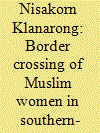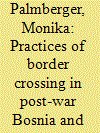| Srl | Item |
| 1 |
ID:
088016


|
|
|
|
|
| Publication |
2009.
|
| Summary/Abstract |
In general, the main roles of married Thai Muslim women were as home makers good wives and good mothers. Nevertheless, both married and single women from rural areas have been increasingly obliged to work outside the household, locally and in other countries. People in rural areas are now faced with the difficulty of maintaining their livelihoods if they depended on agricultural production alone. In some instances, female migration might be a response to families not being able to survive on the incomes earned by the male household heads. In response, women in southern Thailand provinces use long-standing social networks that facilitate their migration for work, because they benefit from the close proximity, language, and religion that they share with the destination area. Commonly, they travel to work in Malaysia by using a border pass, while some travel and work without any documents. The effects of crossing national borders on migrants themselves and on their communities are mixed, generally positive from an economic perspective, but negative from a social viewpoint. Socially negative responses reflect a system of social control in the region based on patriarchy.
|
|
|
|
|
|
|
|
|
|
|
|
|
|
|
|
| 2 |
ID:
123922


|
|
|
|
|
| Publication |
2013.
|
| Summary/Abstract |
In this article, I bring together literature from the fields of memory and reconciliation to investigate practices of 'border crossing' in post-war Bosnia and Herzegovina. While national divisions prevail, subtle attempts at border crossing can be witnessed even in those areas most impacted by the war's partition, such as in Mostar, a city that has been left divided into Croat and Bosniak sides. Borders are physically crossed to reintegrate the 'other side' into one's everyday life, but also in a more metonymical sense through the questioning of absolute national identities. Such acts of border crossing heavily rely on memories of positive pre-war cross-national relations, which are brought forward to re-establish these relations in post-war times. The research findings suggest that re-enacting a shared common ground - most often found in the past rather than in the present - bears an integrative potential that deserves more attention in post-conflict settings.
|
|
|
|
|
|
|
|
|
|
|
|
|
|
|
|